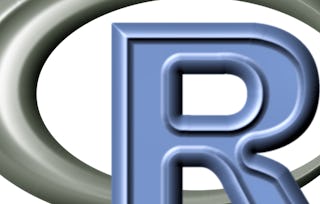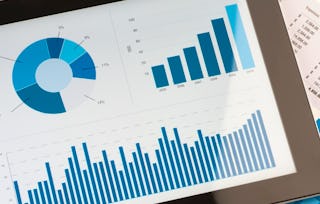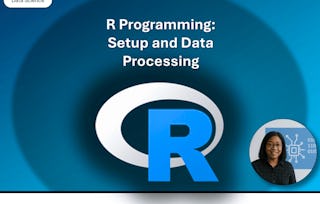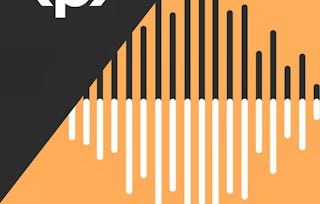In this course you will learn how to program in R and how to use R for effective data analysis. You will learn how to install and configure software necessary for a statistical programming environment and describe generic programming language concepts as they are implemented in a high-level statistical language. The course covers practical issues in statistical computing which includes programming in R, reading data into R, accessing R packages, writing R functions, debugging, profiling R code, and organizing and commenting R code. Topics in statistical data analysis will provide working examples.

R Programming
This course is part of multiple programs.



Instructors: Roger D. Peng, PhD
747,212 already enrolled
Included with
22,362 reviews
Recommended experience
What you'll learn
Understand critical programming language concepts
Configure statistical programming software
Make use of R loop functions and debugging tools
Collect detailed information using R profiler
Skills you'll gain
Details to know

Add to your LinkedIn profile
6 assignments
See how employees at top companies are mastering in-demand skills

Build your subject-matter expertise
- Learn new concepts from industry experts
- Gain a foundational understanding of a subject or tool
- Develop job-relevant skills with hands-on projects
- Earn a shareable career certificate

There are 4 modules in this course
This week covers the basics to get you started up with R. The Background Materials lesson contains information about course mechanics and some videos on installing R. The Week 1 videos cover the history of R and S, go over the basic data types in R, and describe the functions for reading and writing data. I recommend that you watch the videos in the listed order, but watching the videos out of order isn't going to ruin the story.
What's included
28 videos9 readings1 assignment7 programming assignments
Welcome to Week 2 of R Programming. This week, we take the gloves off, and the lectures cover key topics like control structures and functions. We also introduce the first programming assignment for the course, which is due at the end of the week.
What's included
13 videos3 readings2 assignments3 programming assignments
We have now entered the third week of R Programming, which also marks the halfway point. The lectures this week cover loop functions and the debugging tools in R. These aspects of R make R useful for both interactive work and writing longer code, and so they are commonly used in practice.
What's included
8 videos2 readings1 assignment2 programming assignments1 peer review
This week covers how to simulate data in R, which serves as the basis for doing simulation studies. We also cover the profiler in R which lets you collect detailed information on how your R functions are running and to identify bottlenecks that can be addressed. The profiler is a key tool in helping you optimize your programs. Finally, we cover the str function, which I personally believe is the most useful function in R.
What's included
6 videos4 readings2 assignments3 programming assignments
Earn a career certificate
Add this credential to your LinkedIn profile, resume, or CV. Share it on social media and in your performance review.
Instructors

Offered by
Explore more from Data Analysis
 Status: Free Trial
Status: Free TrialJohns Hopkins University
 Status: Preview
Status: PreviewMicrosoft
 Status: Free Trial
Status: Free TrialLogical Operations
Why people choose Coursera for their career

Felipe M.

Jennifer J.

Larry W.

Chaitanya A.
Learner reviews
- 5 stars
68.05%
- 4 stars
22.12%
- 3 stars
5.82%
- 2 stars
2.09%
- 1 star
1.90%
Showing 3 of 22362
Reviewed on Mar 2, 2016
A great introduction to slightly more complicated R programming. Basic concepts covered well and it builds nicely to the point where you feel like you can apply your knowledge to real world examples
Reviewed on Apr 27, 2016
This course fully meets my expectations. It provides a concise starting point and even manages to introduce advanced concepts such as the 'apply' family. The final assignment is fully appropriate.
Reviewed on Sep 6, 2017
Great course for people who work with data a lot. This course actually helps in looking at data in its basic forms, helps understand transformations better, and gives ideas about playing with it.

Open new doors with Coursera Plus
Unlimited access to 10,000+ world-class courses, hands-on projects, and job-ready certificate programs - all included in your subscription
Advance your career with an online degree
Earn a degree from world-class universities - 100% online
Join over 3,400 global companies that choose Coursera for Business
Upskill your employees to excel in the digital economy
Frequently asked questions
To access the course materials, assignments and to earn a Certificate, you will need to purchase the Certificate experience when you enroll in a course. You can try a Free Trial instead, or apply for Financial Aid. The course may offer 'Full Course, No Certificate' instead. This option lets you see all course materials, submit required assessments, and get a final grade. This also means that you will not be able to purchase a Certificate experience.
When you enroll in the course, you get access to all of the courses in the Specialization, and you earn a certificate when you complete the work. Your electronic Certificate will be added to your Accomplishments page - from there, you can print your Certificate or add it to your LinkedIn profile.
Yes. In select learning programs, you can apply for financial aid or a scholarship if you can’t afford the enrollment fee. If fin aid or scholarship is available for your learning program selection, you’ll find a link to apply on the description page.
More questions
Financial aid available,



